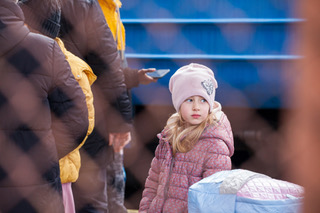At the outbreak of the US-NATO proxy war with Russia fought out in the streets, towns and villages of Ukraine after the Russian invasion of that country, the Government gave a fulsome commitment to taking in up to 100,000 refugees—despite the fact that for decades they have been saying that there was a limit to the number of political refugees the country could take in (particularly if black or brown).
It has been clear from the very start of this conflict that the Irish state was committed to doing whatever was necessary in support of the US-NATO-EU strategy. The minister for foreign affairs, Simon Coveney, has been the most pro-NATO pro-militarisation of any foreign minister for decades. This and previous Irish governments have shown little real energy in solving the dire shortage of housing, in contrast to the energy being expended in backing the US-NATO-EU proxy war. Apart from the political elements of the refugee crisis, it shows a continuous fault of governance in the state: no planning. Decisions are announced before any consideration of their feasibility.
This state has almost reached the limits of the number of Ukrainian refugees it can accommodate. So far more than 60,000 have arrived. The Government’s refugee strategy has also exposed the deep racism within the state and the refugee polices regarding political refugees from other countries.
Refugees coming from the Middle East, Afghanistan and the African continent have spent years in direct-provision centres, subjected to poor and exploitative accommodation and living on poverty-level supports. All refugees—and all applicants for refugee status—should be treated equally, regardless of their origin.
Contrast this with the way that Ukrainian refugees have been treated, receiving far greater monetary supports, priority accommodation, medical cards, transport support, access to third-level education—services and supports denied those who have arrived from other countries seeking political asylum, entitlements that Irish workers have limited access to, fuelling anger and frustration within communities. The liberal and trendy lefties, whether they like it or not, are falling in behind the Government’s—i.e. NATO’s—strategy in relation to Ukraine, a form of humanitarian imperialism.
The Government’s support for the proxy war is exacerbating the housing and accommodation difficulties being experienced by tens of thousands of Irish working people. A spin-off for the establishment flowing from the influx is that these refugees are filling vacancies in low-paid service jobs, such as hotels.
It is estimated that the state will spend up to €600 million this year, rising to more than €1 billion in 2023, to support its strategy of backing the proxy war in Ukraine. This is a huge honey pot for the owners of hotels and other providers of accommodation—all coming from the public purse and adding to the national debt, which workers know from experience will be paid for in cuts in their wages, terms and conditions and in public services. This is indirectly financing this proxy war.
Not alone has the state made its commitment to the NATO war effort by bringing in large number of Ukrainians, it is also providing medical services to Ukrainian fighters. The Government has agreed to take part in the EU military strategy and has agreed to send training personnel to Ukraine on mine-clearing duties. The deployment of Irish military personnel numbering more than twelve must be subjected to the “triple lock.” This is a clear military intervention on the side of NATO and a clear breach of neutrality.
The state has denied resources to communities around the country for decades. Now there appears to be no end to the resources to be made available to encourage communities if they row in behind the Government’s Ukraine strategy. This is a strategy that will foster racism within sections of society as people scramble, in competition with each other, for such scarce resources as housing, education, and health services.
To those who believe the Government is allowing too many Ukrainian refugees into the country: we should not focus on the individuals who have arrived here looking for political asylum but rather give them every support.
To end the plight of the tens of thousands of people leaving their homes in Ukraine this state needs to adopt a different strategy, one of supporting and promoting an anti-war and de-escalation strategy regarding NATO’s proxy war.
The only solution for all problems arising from the conflict in Ukraine is to demand a ceasefire. This also applies to other conflict zones, mostly fostered by Western interference.
Positive neutrality does not mean standing aside and doing nothing but rather actively promoting peaceful solutions to conflicts, where conflict has broken out to actively bring the opposing sides together to engage in peace talks, and to campaign for disarmament both in conventional weapons of mass destruction and in chemical and nuclear weapons.
A positive foreign policy would also include ending unequal and unfair trading relations, strengthening the United Nations, and giving more power to the General Assembly, reducing the power of the Security Council. A progressive foreign policy would also involve efforts to revive and build the Non-Aligned Movement.






